Books

Argentina Betrayed: Memory, Mourning, and Accountability
By Antonius C. G. M. Robben. The ruthless military dictatorship that ruled Argentina between 1976 and 1983 betrayed the country’s people, presiding over massive disappearances of its citizenry and, in the process, destroying the state’s trustworthiness as the guardian of safety and well-being. Desperate relatives risked their lives to find the disappeared, and one group…
Read more
The Justice Facade: Trials of Transition in Cambodia
By Alexander Hinton. Is there a point to international justice? Many contend that tribunals deliver not only justice but truth, reconciliation, peace, democratization, and the rule of law. These are the transitional justice ideals frequently invoked in relation to the international hybrid tribunal in Cambodia that is trying senior leaders of the Khmer Rouge regime for…
Read more
Healing from Hate: How Young Men Get Into—and Out of—Violent Extremism
By Michael Kimmel. What draws young men into violent extremist groups? What are the ideologies that inspire them to join? And what are the emotional bonds forged that make it difficult to leave, even when they want to? Having conducted in-depth interviews with ex–white nationalists and neo-Nazis in the United States, as well as ex-skinheads…
Read more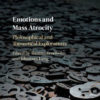
Emotions and Mass Atrocity: Philosophical and Theoretical Explanations
Edited by Thomas Brudholm and Johannes Lang. The study of genocide and mass atrocity abounds with references to emotions: fear, anger, horror, shame and hatred. Yet we don’t understand enough about how ‘ordinary’ emotions behave in such extreme contexts. Emotions are not merely subjective and interpersonal phenomena; they are also powerful social and political forces,…
Read more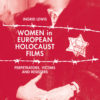
Women in European Holocaust Films: Perpetrators, Victims and Resisters
By Ingrid Lewis. This book considers how women’s experiences have been treated in films dealing with Nazi persecution. Focusing on fiction films made in Europe between 1945 and the present, this study explores dominant discourses on and cinematic representation of women as perpetrators, victims and resisters. Ingrid Lewis contends that European Holocaust Cinema underwent a…
Read more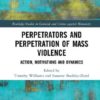
Perpetrators and Perpetration of Mass Violence: Action, Motivations and Dynamics
Edited by Timothy Williams and Susanne Buckley-Zistel. As the most comprehensive edited volume to be published on perpetrators of mass violence, the volume sets a new agenda for perpetrator research by bringing together contributions from such diverse disciplines as political science, sociology, social psychology, history, anthropology and gender studies, allowing for a truly interdisciplinary discussion…
Read more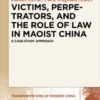
Victims, Perpetrators and the Practice of Law in Maoist China: A Case-Study Approach
Edited by Daniel Leese and Puck Engman. The relationship between politics and law in the early People’s Republic of China was highly contentious. Periods of intentionally excessive campaign justice intersected with attempts to carve out professional standards of adjudication and to offer retroactive justice for those deemed to have been unjustly persecuted. How were victims…
Read more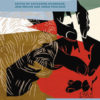
The Indonesian Genocide of 1965: Causes, Dynamics and Legacies
Edited by Katharine McGregor, Jess Melvin and Annie Pohlman. This collection of essays by Indonesian and foreign contributors offers new and highly original analyses of the mass violence in Indonesia which began in 1965 and its aftermath. Fifty years on from one the largest genocides of the twentieth century, they probe the causes, dynamics and…
Read more
Guatemala, the Question of Genocide
Edited by Elizabeth A. Oglesby and Diane M. Nelson. In Guatemala, it was called the “trial of the century”: the 2013 prosecution of former de facto head of state (1982-1983) General José Efraín Ríos Montt and his intelligence chief, General José Mauricio Rodríguez Sánchez, on charges of genocide and crimes against humanity against the Maya-Ixil people. Ríos…
Read more
Interrogating the Perpetrator: Violation, Culpability, and Human Rights
Edited by Cathy J Schlund-Vials and Samuel Martínez. Set adjacent to “victims” and “bystanders,” “perpetrators” are by no means marginalized figures in human rights scholarship. Nevertheless, the extent to which the perpetrator is not only socially imagined but also sociologically constructed remains a central concern in studies of state-authorized mass violence. This interdisciplinary collection of essays builds…
Read more
